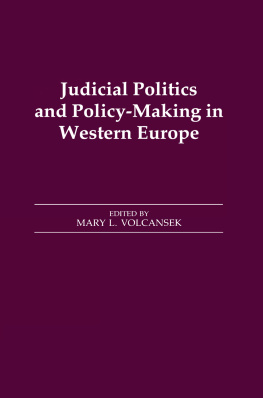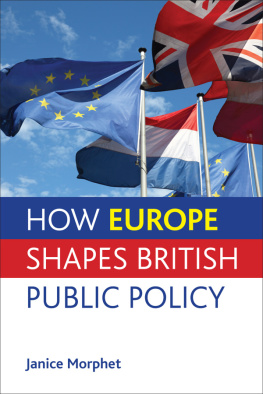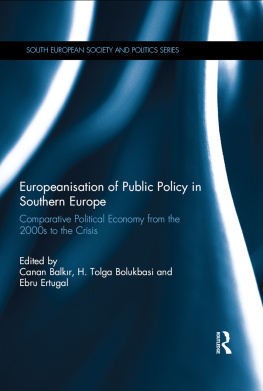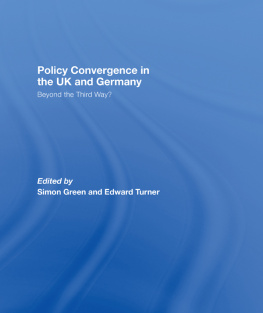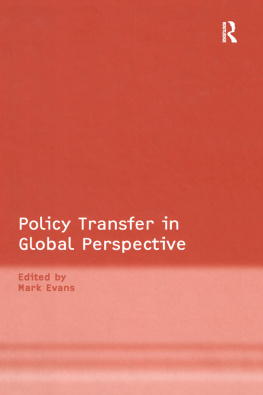Routledge Revivals
Policy Styles in Western Europe
First published in 1982, Policy Styles in Western Europe considers the growth of the modern state in the 1980s and examines the implications of this for the making and implementation of public policy decisions. It argues that the business of government was simply easier in the 1970s and that the growth of the modern state has meant an expansion of public policies, with the state widening in areas of societal activity. This book looks at the similarities and differences that exist among the countries of Western Europe.
Whilst it is increasingly clear that most policy problems arise from areas of concern common to all Western democracies, for example, unemployment, inflation and crime, this book focuses on whether or not individual countries exhibit characteristic policy styles in response to them. In this volume, the country-studies consider the main characteristics of the individual policy processes in relation to a simple typology of political styles. Each author considers a series of central questions: the relationship between the government and other actors in the policy process; the degree to which policy-making has become sectorised and segmented; and the broad approach to problem solving in terms of anticipatory or reactive styles.
Policy Styles in Western Europe
Edited by
Jeremy Richardson
First published 1982
by George Allen & Unwin Ltd
This edition first published in 2013 by Routledge
2 Park Square, Milton Park, Abingdon, Oxon, OX14 4RN
Simultaneously published in the USA and Canada
by Routledge
711 Third Avenue, New York, NY 10017
Routledge is an imprint of the Taylor & Francis Group, an informa business
1982 Jeremy Richardson
All rights reserved. No part of this book may be reprinted or reproduced or utilised in any form or by any electronic, mechanical, or other means, now known or hereafter invented, including photocopying and recording, or in any information storage or retrieval system, without permission in writing from the publishers.
Publisher's Note
The publisher has gone to great lengths to ensure the quality of this reprint but points out that some imperfections in the original copies may be apparent.
Disclaimer
A Library of Congress record exists under ISBN: 82011415
ISBN: 978-0-415-64131-9 (hbk)
ISBN: 978-0-203-08201-0 (ebk)
Policy Styles in Western Europe
Policy Styles in Western Europe
Edited by
Jeremy Richardson
University of Strathclyde
Jeremy Richardson, 1982
This book is copyright under the Berne Convention. No reproduction without permission. All rights reserved.
George Allen & Unwin (Publishers) Ltd
40 Museum Street, London WC1A 1LU, UK
George Allen & Unwin (Publishers) Ltd
Park Lane, Hemel Hempstead, Herts HP2 4TE, UK
Allen & Unwin, Inc.
9 Winchester Terrace, Winchester, Mass. 01890, USA
George Allen & Unwin Australia Pty Ltd
8 Napier Street, North Sydney, NSW 2060, Australia
First published in 1982
British Libraty Cataloguing in Publlication Data
Policy styles in Western Europe.
1. Europe-Politics and government, 1945
I. Richardson, Jeremy
320.94 JN94.A2
ISBN 0-04-350062-5
Library of Congress Cataloguing in Publlication Data
Main entry under title:
Policy styles in Western Europe.
Includes index.
1. Europe Politics and government 1945
Addresses, essays, lectures. 2. Comparative government
Addresses, essays, lectures. 3. Policy sciences
Addresses, essays, lectures. I. Richardson, J. J.
(Jeremy John)
JN94.A91P64 1982 320.3'094 82-11415
ISBN 0-04-350062-5
ISBN: 978-0-415-64131-9 (hbk)
ISBN: 978-0-203-08201-0 (ebk)
Set in 10 on 11 point Ehrhardt by Fotographics (Bedford) Ltd
and printed in Great Britain by
Billing and Sons Ltd, London and Worcester
Contents
| Jeremy Richardson, University of Strathclyde; |
| Gunnel Gustafsson, University of Urne; |
| Grant Jordan, University of Aberdeen |
| Kenneth Dyson, University of Bradford |
| Johan Olsen, Paul Roness and Harald Stren, University of Bergen |
| Grant Jordan, University of Aberdeen and |
| Jeremy Richardson, University of Strathclyde |
| Jack Hayward, University of Hull |
| Olof Ruin, University of Stockholm |
| Jan van Putten, Free University of Amsterdam |
| Jeremy Richardson, University of Strathclyde |
It is now almost commonplace to argue that modern Western European governments are overloaded, that policy failure rather than success is the norm and that citizens and groups are more inclined towards acts of noncompliance. In short, it is believed that the business of government is somehow more difficult in the 1980s than it was in the 1970s. In turn, the 1970s was seen as a more difficult decade for many Western European countries than the 1960s, notwithstanding the widespread student disorders in the latter.
In analysing the degree to which government might be becoming more difficult, it is important to focus on one of the central activities of modern governments the making and implementing of public policies. The growth of the modern state has in practice meant a rapid expansion of public policies. The state has widened its areas of concern such that virtually all aspects of societal activity are now subject to some form of regulation (in the broadest sense of the term) through public policies. The last decade has seen political science in Europe develop a recognition of the central role of policies in the political system. Increasingly, we recognise that many policy problems are common to all industrialised democracies. For example, unemployment, inflation, crime, threatened energy shortages, pollution and the intransigence of organised groups are common features of every Western European nation today. Policy responses to these problems may also be quite similar (for instance, in dealing with unemployment). Moreover, analysis of single-country studies of policy process suggests that the similarities in the processes by which responses are formulated and implemented are much greater than the differences. What each analyst may see as features unique to his own country often turn out to be equally evident elsewhere. For example, interest groups are often seen as uniquely powerful in single-country studies, whereas it is a feature of most Western European democracies that interest groups are accorded a very central role in all stages of the policy process.
Could it be, then, that problems and policy responses, and the political processes adopted in formulating those responses, are converging in Western Europe? Do Western European democracies have a particular way of doing things in the policy field from which we can identify certain key characteristics? Is it possible to identify the primary characteristics of the policy processes in individual countries with a view to classifying them according to a simple typology of



